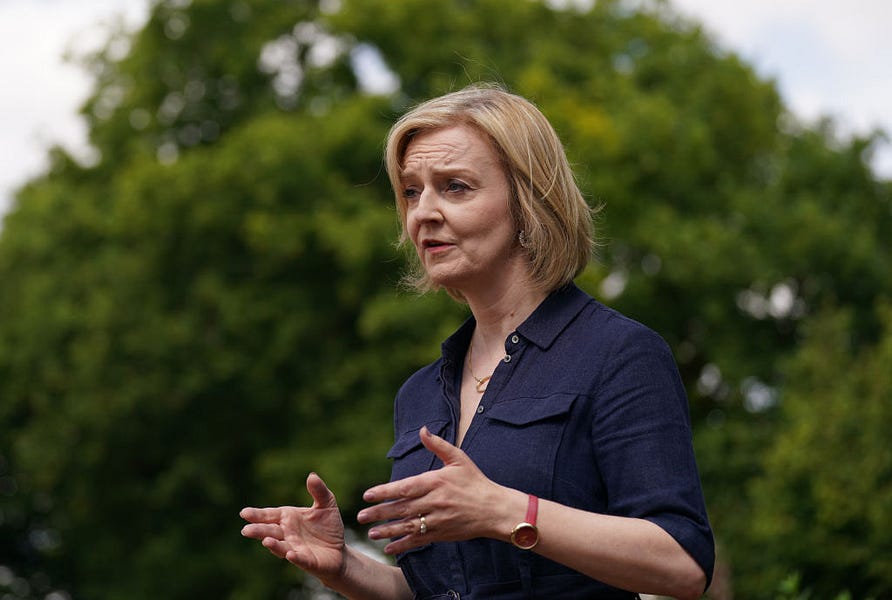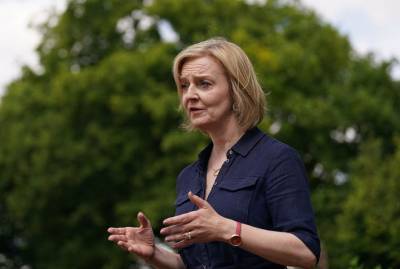Boris Johnson stepped down as leader of the Conservative Party a little more than three weeks ago, and since then, the Tories have been going through a frantic process of choosing their next leader, a process that is now in its final stage. The choice is now between Rishi Sunak, the former chancellor, and Liz Truss, who has served in various cabinet positions and is currently the foreign secretary. Whoever is chosen will become prime minister by default, as the Conservatives have a majority in the House of Commons, and they will have little more than two years to turn things around before an election that must take place no later than January 2025. Truss is a huge favorite to win, and one of her first challenges will be dealing with labor unions, as the U.K. now faces the threat of a general strike.
The United Kingdom is, like most countries in the West, struggling with high levels of inflation. Its 9.4 percent inflation rate is comparable to the United States’, but the country’s higher rate of unionization means that tackling inflation is substantially more difficult. Rail workers have gone on rolling strikes to protest a below-inflation pay rise, which has left as few as one in five trains running some days—a big problem in a country where commuting to work by public transport is four times as common as it is in the U.S.
As paralyzing as this is, it pales in comparison to the upcoming disaster of a National Health Service strike. The nurses’ union has recently announced it will vote on whether to go on strike, and the strike would, if approved, mean disaster for the U.K.’s universal health care system, as the vast majority of nurses in the U.K. are unionized.
And this, in turn, pales in comparison to the disaster that would be a general strike, a proposal that has been raised by several union bosses and supported by left-wing politicians, should Truss become prime minister and proceed with her plans for labor market reforms, which the unions describe as “Victorian.”
Fearing a wage-price spiral, in which higher salaries cause higher inflation leading to further demands for even higher salaries (and higher taxes and deficit spending to pay for those salaries), Truss has announced that she will propose legislation within her first 30 days in office that would limit the unions’ ability to call strikes.
Every strike is preceded by a vote among union members, and currently, only 40 percent of members must support a strike in order for a strike to be approved. Under Truss’ proposal, this minimum threshold would be raised to 50 percent, as it makes no sense for an entire union to go on strike without the explicit approval of a majority of its members. Interestingly, the 40 percent requirement was itself controversial when it was introduced in 2016. In 2012, the teachers’ union went on a strike with just 22 percent of its members voting in favor of this action.
Second, the minimum notice period before a strike would be raised from two to four weeks, allowing more time for employers, employees, and consumers to prepare for a strike, reducing the disruptiveness caused by a sudden strike in vital national infrastructure services.
Third, Truss would push to introduce a cooling-off period after each strike. Currently, after members have voted in favor of a strike, union bosses can call as many strikes as they like in the six months after the vote takes place, without seeking a new mandate from members for each strike action. Truss would change this.
Fourth, striking union members would no longer be able to receive tax-free payments from their union, substantially increasing the cost of striking (the average effective income tax rate in the U.K. is 23.7 percent).
Finally, Truss has stated that, in response to the rail strikes, she would legislate to ensure a minimum service level on critical national infrastructure, thus effectively limiting the number of employees who can be on strike at any given time, which in turn reduces the efficacy of a strike.
Despite unions comparing these reforms to the infamous Victorian workhouses of the 19th century, they are in fact all reasonable. While it is easy to empathize with workers whose wages are not keeping pace with inflation, especially those working in health care, there is no way to reduce inflation that does not involve reducing the rate of pay increases. Rapid public sector pay increases cause pressure on private businesses to keep up and “outbid” the public sector, causing generally higher wage levels with no improvement in productivity, which in turn creates inflation, as prices must increase to pay for this. At a time when the U.K. has already had to raise taxes to fund its health care system’s efforts to catch up after the pandemic caused a host of delays in care, the pay increases asked for by the unions would inevitably require even steeper hikes that would destroy British competitiveness.
Without curbing wage growth, the only realistic tool left to reduce inflation would be through monetary policy. With no help from the government in London, the Bank of England would be forced to raise interest rates even more than they otherwise would. In a country with an 89.4 percent household-debt-to-GDP ratio, such drastic increases in interest rates would almost certainly spell disaster for the British economy and for millions of British homeowners. For comparison, the U.S. household-debt-to-GDP ratio stands at a relatively low 67 percent.
Unions that prefer a housing and financial crisis to a year with subpar wage growth show a dangerous disregard for the well-being of their members, who may soon find themselves forced out of their homes as mortgage rates spike.
It is crucial that Truss stands firm against the unions’ demands, and that she receives the backing of her MPs. To stand a chance of winning re-election, Truss must begin her premiership with a Thatcher moment. Margaret Thatcher famously broke union power in the U.K. by confronting the National Union of Mineworkers, at the time an absolutely essential workforce as the U.K. relied on coal for heating and energy.
In decades prior, the NUM had been able to bring the economy to a halt by striking, most famously in 1974. Mining strikes meant there was not enough electricity to allow businesses to be open five days a week, leading the government to institute a three-day work week. The union went on strike because the government refused to grant an outrageous 35 percent annual pay increase to the miners.
Thatcher, wise to this kind of extortion, introduced a scheme through which the government would secretly stock up on coal. After several years of stockpiling, her government confronted the NUM, which, unaware of how bad its position was, went on strike in 1984. Unlike in 1974, British society kept functioning more or less as it had before, and the economy kept growing. The government simply waited for the union’s funds that it used to pay the living costs of the striking miners to run out.
As this happened, the number of strikebreakers increased, until the strike formally ended almost exactly to the day a year after it had begun. This show of strength from the Conservative British government forever changed the dynamics on the labor market: If even what was arguably the strongest union in the country did not stand a chance against Thatcher, what chance did the rest of them have?
By standing firm and daring the unions to call a general strike, Truss can send the same message to the unions that Thatcher did back then: You do not run this country. The difficulty with strikes in the service sector (such as transport and health care) is that, unlike coal, you cannot “stock up” on health care or train fares. Nevertheless, the government does have the option of creating a skilled worker immigration scheme specifically targeted at these sectors. The U.K. has the benefit of a language that is widely spoken and understood throughout the world, and could easily recruit health care workers from countries such as India, Nigeria, and other developing countries that form part of its commonwealth (almost 10 percent of British health care workers already have a non-U.K., non-European nationality).
After introducing such a migration scheme with a targeted international recruitment campaign, the government could then turn to striking workers and inform them that, if an immigrant is found who is willing to take a striker’s place, that immigrant will be hired permanently, and the striker will not be welcome back regardless of future developments. By offering permanent residence as opposed to temporary work visas, the U.K. government would drastically increase the appeal of such a scheme. Recruitment could also be successfully carried out in the poorer EU countries whose citizens flocked to Britain in the hundreds of thousands before Brexit ended free movement.
In addition to the economic arguments, a tough line against the unions would also pose a serious conundrum for Labour Party leader Keir Starmer, who took over after the unsuccessful tenure of far-left Jeremy Corbyn, who lost the 2019 elections to Boris Johnson in a landslide. Starmer is center-left, but his party’s core voters and membership are not. His position as party leader has never been strong, and his mandate has from the very beginning been very much unclear.
A general strike would leave Starmer stuck between a rock and a hard place: While public sympathy for strikers tends to be high prior to any strike, Starmer is competent enough to know that patience with strikers tends to run out quickly once the strike takes place and regular people find their everyday lives affected. This goes in particular for strikes in vital sectors such as health care. To side publicly with the unions, as scores of his MPs demand he do, would be politically damaging. On the other hand, appearing “weak” in the face of a confrontation between workers and a conservative government would reduce turnout among his own voters, and doubtlessly boost the prospects of left-winged alternatives such as the Green Party, which may siphon off enough votes in marginal constituencies to allow the Conservatives to win. Unite, the U.K.’s second largest labor union, has also threatened to withdraw funding from the Labour Party should Starmer refuse to back strike action.
With the Tories down 10 percent in most opinion polls, drastic changes are necessary if the party is to have any chance of turning around its fortunes in time for the next election. Breaking union power is now as in the 1980s the key to breaking inflation and ushering in a new era of economic prosperity for Britain. Quite simply, the U.K. needs another Thatcher moment.






Please note that we at The Dispatch hold ourselves, our work, and our commenters to a higher standard than other places on the internet. We welcome comments that foster genuine debate or discussion—including comments critical of us or our work—but responses that include ad hominem attacks on fellow Dispatch members or are intended to stoke fear and anger may be moderated.
With your membership, you only have the ability to comment on The Morning Dispatch articles. Consider upgrading to join the conversation everywhere.